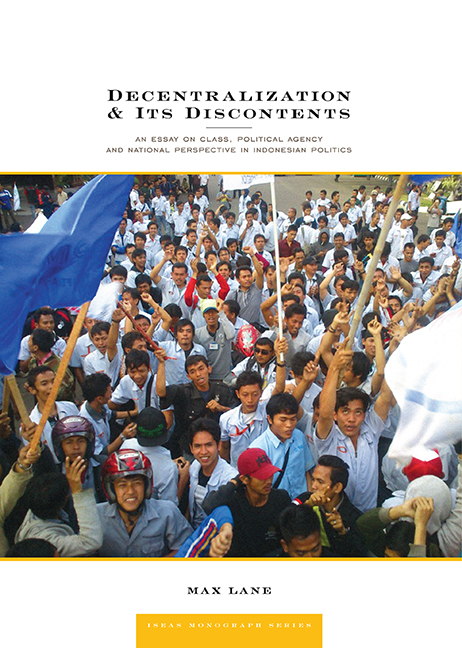 Decentralization and Its Discontents
Decentralization and Its Discontents Book contents
- Frontmatter
- Contents
- Editorial Note
- Preface
- About the Author
- Introduction
- I The Enigmatic Emergence of Decentralization
- II The Political Economy of Desentralisasi
- III Decentralization: Its Discontents
- IV National Agency in a “Co-ordinative State”: The Future of Decentralization
- Conclusion
- Endnotes
- References
I - The Enigmatic Emergence of Decentralization
Published online by Cambridge University Press: 21 October 2015
- Frontmatter
- Contents
- Editorial Note
- Preface
- About the Author
- Introduction
- I The Enigmatic Emergence of Decentralization
- II The Political Economy of Desentralisasi
- III Decentralization: Its Discontents
- IV National Agency in a “Co-ordinative State”: The Future of Decentralization
- Conclusion
- Endnotes
- References
Summary
During the last fourteen years (1999–2013), budgetary authority for spending a significant portion of the national revenue for activities to be carried out by the local apparatus of Indonesian national ministries has been delegated to sub-provincial governments and parliaments, that is town municipalities and county districts, known as kabupaten. At the moment, the core amount is provided through the General Allocation Fund (DAU) which is set at least 26 per cent of Net Domestic Revenue. Regions with major natural resources that bring in foreign revenue also receive a percentage of those revenues, depending on the particular natural resource. There is also a provision for the special allocation of additional funds. This policy direction was also later strengthened by the introduction of direct elections for town mayors and county heads (bupati) as well as governors of provinces. The policies embodied in this new delegation of power, legalized by a series of laws after 2000, are known as the desentralisasi policies.
There can be little doubt that among Indonesian political scientists, and the few Indonesia specialists outside the country, desentralisasi has been one of the most written-about topics in recent scholarly literature on Indonesian politics. There is a plethora of Indonesian honours, masters and doctoral theses on this topic. In realpolitik terms, desentralisasi in and of itself has not brought about major changes in Indonesian politics. The policy has not brought about a change in direction, in terms of either economic or social strategy nor changed — as yet — the underlying character, outlook and activity of those who wield power in Indonesia or their subjects. However, as I have stated earlier, there is also no doubt that the coming of desentralisasi is a resultof two colossal changes in both the political and economic format of Indonesia: the end of authoritarian rule and of Suhartoist crony capitalism.
Reformasi and the Absence of Desentralisasi
Perhaps the best starting point for an analysis of the phenomenon of desentralisasi in Indonesia over the last decade is to note that advocacy for decentralization was completely absent within the movement against authoritarian rule that developed in the 1990s. While I will argue that in its current form, it is a result of the end of authoritarian rule, it was not a result intended by the forces that composed the pro-democracy movement.
- Type
- Chapter
- Information
- Decentralization and Its DiscontentsAn Essay on Class, Political Agency and National Perspective in Indonesian Politics, pp. 1 - 26Publisher: ISEAS–Yusof Ishak InstitutePrint publication year: 2014
